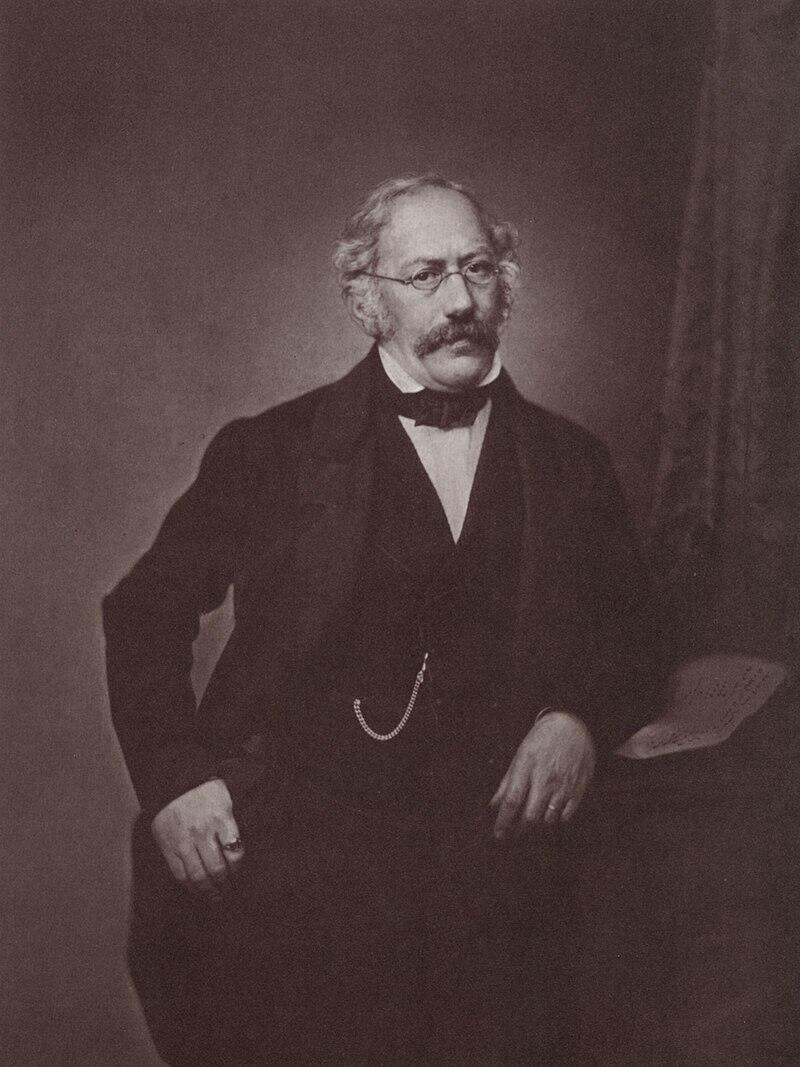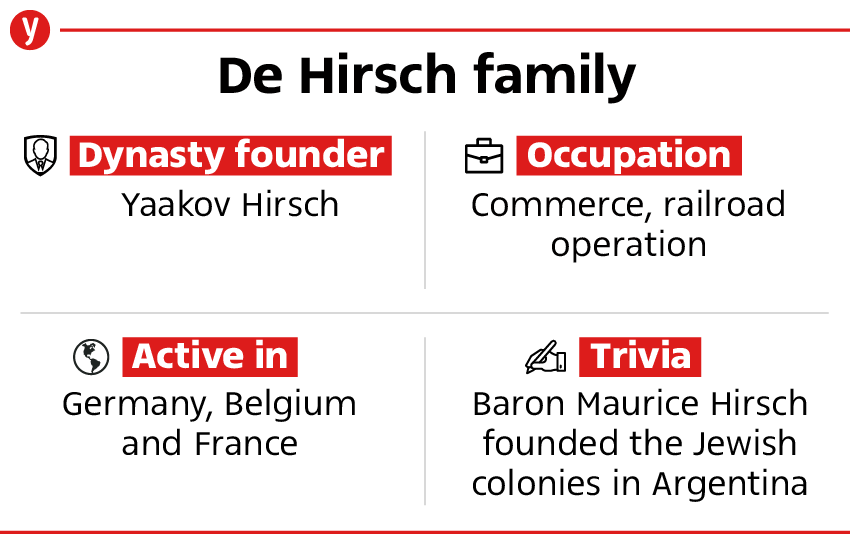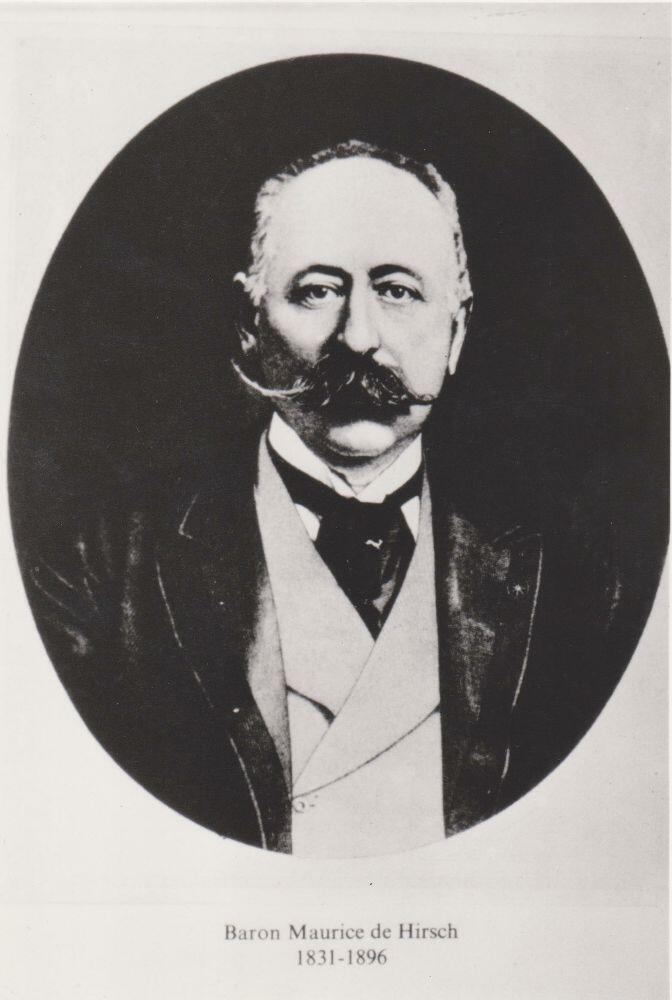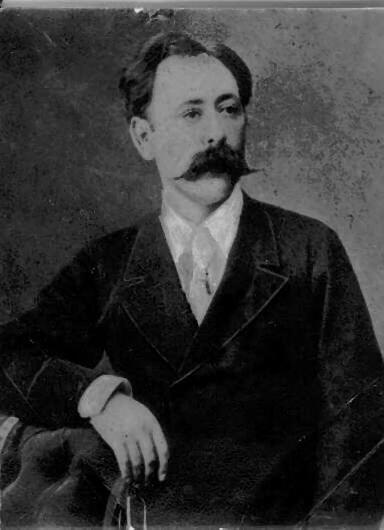Getting your Trinity Audio player ready...
Baron Maurice Hirsch was a renowned 19th-century philanthropist. However, it was his grandfather, Jacob, who first laid the foundation for their fortune by becoming a prominent banker in Munich and donating generously to Jewish causes

Jacob Hirsch earned a noble title for funding wars against Napoleon. His son, Yozef, continued the family's philanthropic legacy by donating to hospitals and promoting railroads, as well as fostering ties to industry and agriculture.
This wealth and success continued with the birth of Maurice (Moshe) de Hirsch in Munich in December 1831. "We tend to generally think that the majority of European Jews were in a desperate situation, and this is sometimes true, certainly for some communities, but there were also wealthy Jewish families in Central Europe," says Prof. Yonatan Dekel-Chen from Hebrew University. "(Maurice's) grandfather had already amassed a fortune, and he was born to a certain level of wealth."
"Changed the face of the Jewish world"
At the age of 17, Maurice began his business career and eventually landed a top position at Bischoffsheim - Goldschmidt et Cie bank in Brussels.
With his initial capital, he invested in railroad projects during the industrial revolution, making him a perfect fit for the time and place. Maurice later married Clara Bischoffsheim, the daughter of the bank's chairman.
According to Prof. Yonatan Dekel-Chen, Maurice was prepared to raise capital and invest in challenging projects, particularly government infrastructure in Turkey and the Balkans. He was among the few who seized the opportunity.
Prof. Dekel-Chen describes Hirsch's impact as transformative: "He changed the face of the Jewish world through his business and his approach to charity. He saw philanthropy not as a handout, but as an investment in society, empowering Jews to be productive and respected citizens. He believed in giving fishing rods, not fish, and helping break the cycle of poverty and dependency."
The decision that frustrated the Zionists
Hirsch's aim was to improve the economic situation of Jews in Eastern Europe by proposing vocational schools to the tsar's regime. However, his plan was unsuccessful, leading him to seek new land for a large project to rescue Jews from poverty.
He founded the Jewish Colonization Association (JCA) and focused on Argentina as a new home for Jewish refugees fleeing the Russian Empire. With an initial capital of two million pounds, he established agricultural colonies to train Jews for manual labor and build a better future free from antisemitism and pogroms.
7 View gallery
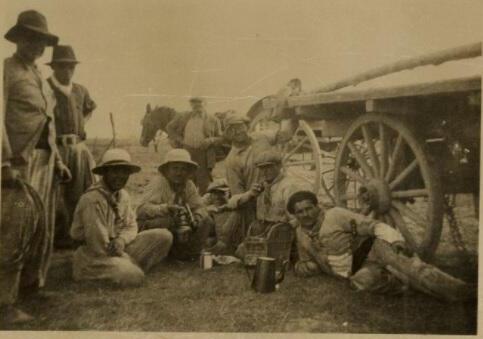

"He set out to look for a new Jewish land." Jews in the Baron Hirsch colony in Argentina
(YKA's photo archive)
According to Prof. Dekel-Chen, Hirsch established a system that enabled Jews to migrate from the Russian Empire to Argentina. The JCA was responsible for locating Jewish individuals and facilitating their relocation to Argentina to establish Jewish communities. This was done with the complete cooperation and endorsement of the Argentine government, which actively supported the initiative.
Some frowned upon his attempt to relocate Jews outside of Israel, didn't they?
"During that period, Zionism was not yet a prevalent movement. JCA, led by Hirsch, began investing in Israel, but he recognized the limitations of putting all resources into one place.
"It was unfeasible to transfer everyone to Israel since there was inadequate infrastructure and no supporting government to accommodate them. This decision frustrated the Zionists, who believed that any funding directed towards Jewish settlements outside the Land of Israel was a missed opportunity to develop the settlements within."
Colonies in southern New Jersey
Dekel-Chen recounts that while Baron Hirsch's representatives were exploring opportunities in Argentina, they also considered options in North America and began laying the groundwork for establishing colonies there.
These agricultural communes, known as "Am Olam," were ultimately unsuccessful, but the experience gained from these attempts aided the baron's officials in making more informed decisions for future settlements.
They established colonies in southern New Jersey that endured until after World War II and served as a safe haven for approximately 200,000 Jews.
These agricultural communes, known as "Am Olam," were ultimately unsuccessful, but the experience gained from these attempts aided the baron's officials in making more informed decisions for future settlements
How did these failures readjust the baron and his men?
"Recognizing that a Jewish settlement required proximity to other Jewish communities, the baron and his team established a cluster of colonies. They also founded the first agricultural school in the United States.
"They realized that the colonies needed to be located near large cities, where Jewish communities were present. In southern New Jersey, there was a small industry in addition to agriculture to ensure a consistent annual income for the Jewish settlers, rather than just a seasonal one."
Meeting Herzl
The divergence between Hirsch's ideology and the pioneers of Zionism came to a head during his encounter with the movement's founder, Theodor Herzl, who approached him for support.
According to Herzl's diary, they met in Paris in 1895, but negotiations with Hirsch were unsuccessful. This setback led Herzl to realize that he needed to take matters into his own hands to realize the concept of a Jewish state.
According to Dekel-Chen, during that period, Herzl held discussions with several significant figures, including heads of state and Jewish benefactors. However, none of them displayed much enthusiasm for his movement.
Although Hirsch regarded Herzl as a kind person and acknowledged the potential validity of his vision, like others of his time, he believed that Zionism was not a viable solution to the pressing issues facing the Jewish people.
Although Hirsch regarded Herzl as a kind person and acknowledged the potential validity of his vision, he believed that Zionism was not a viable solution to the pressing issues facing the Jewish people
One can gauge the high regard that the Jews of Maurice de Hirsch's time held for him by simply reading the cover of the Hebrew newspaper "Hatzifira" after his unexpected passing in April 1896, which read "Baron Hirsch is gone!"
The communities of Sde Moshe and Nir Zvi were named in honor of Maurice de Hirsch, with "Moshe" being his Hebrew name and "Hirsch" meaning "deer" or "Zvi" in Hebrew. Following his passing, his fortune was bequeathed to his wife Clara, who carried on his philanthropic legacy until her passing in 1899. It is estimated that the couple's charitable donations during their lifetimes totaled $100 million.
The heirs
Baron Edmond de Rothschild made the decision in 1900 to transfer his backing of Israeli settlements to the JCA, which had been established by Baron Hirsch.
7 View gallery
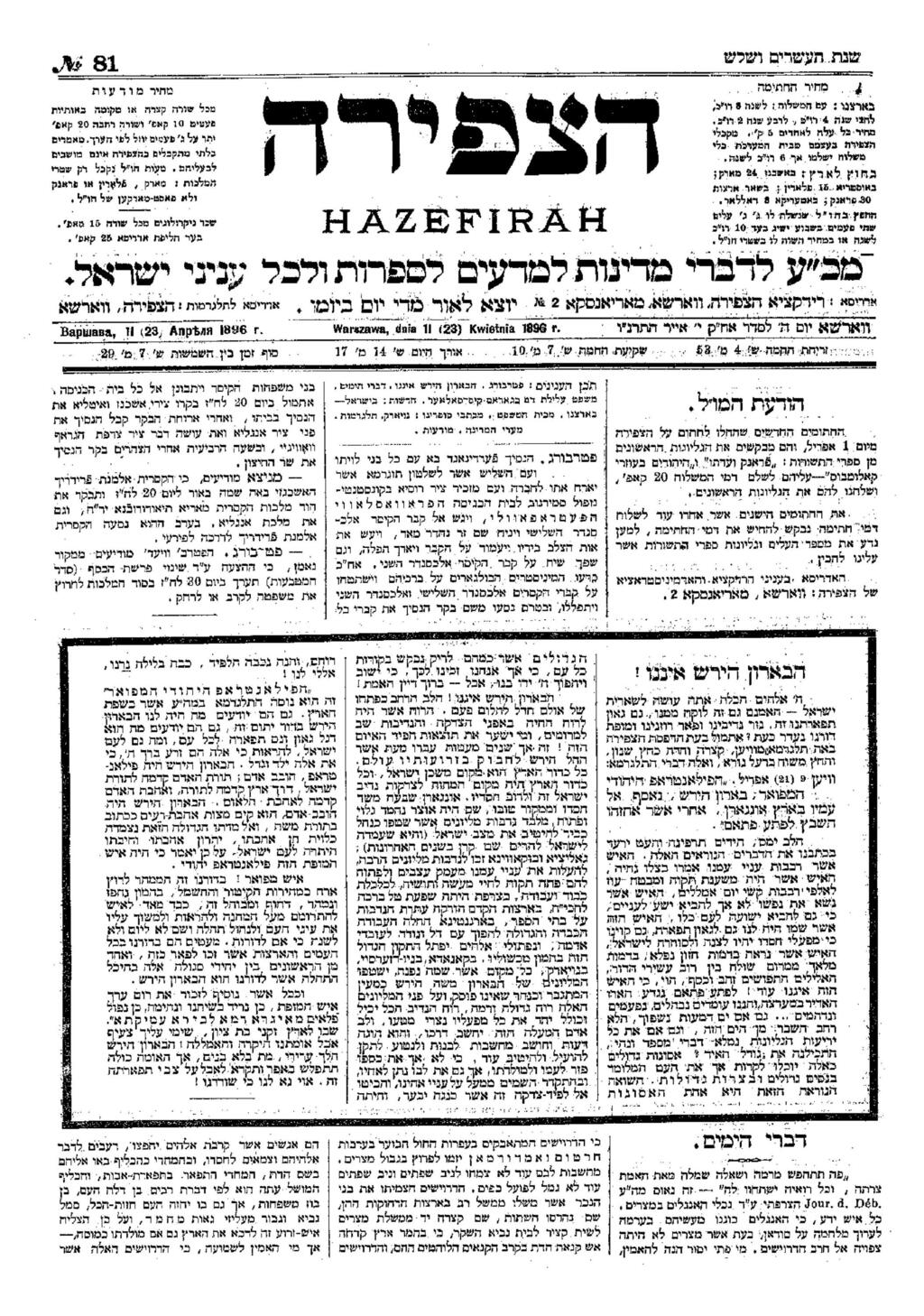

The newspaper announcement of the Baron's demise
(Photo: Historical Jewish Journalism)
This move came as a surprise, particularly given the strained relationship between the two barons during Hirsch's lifetime. However, after the British took control of Eretz Israel, Rothschild shifted his focus and devoted all of his resources to the establishment of a Jewish state there.
After the tragic death of their only son Lucien, Maurice and Clara Hirsch turned to adoption and welcomed Maurice Arnold and Raymond de Forest into their family. The two boys had lost their biological parents to typhus and were taken in by the wealthy couple in 1887, shortly after they had suffered the loss of their only child.
Following the passing of their adoptive parents, the de Forest brothers inherited a vast fortune along with multiple properties. Maurice Arnold de Forest was a multifaceted personality who had pursued various interests.
He was a liberal-minded politician who served as a member of the British House of Representatives and had formed a close bond with Winston Churchill. Additionally, he was an animal rights advocate and a race car driver who actively participated in competitions.
Following the passing of their adoptive parents, the de Forest brothers inherited a vast fortune. Maurice Arnold de Forest was a multifaceted personality who had pursued various interests
He had a granddaughter named Emily de Forest, who later became a renowned singer and had the honor of representing Denmark in Eurovision 2013. She secured the top spot in the competition with her soulful rendition of "Only Teardrops."
Interestingly, just a year ago, she graced the stage of the "Israel Calling" event, which caters to Eurovision enthusiasts in Israel, and left the audience in awe with her mesmerizing performance.



